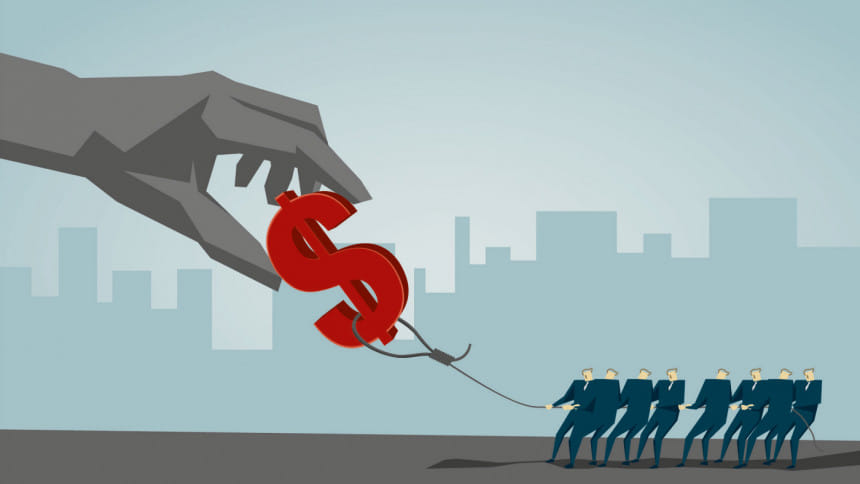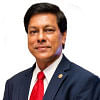As the pandemic continues, the rich are getting richer

The Covid-19 pandemic may have taken a heavy toll on the global economy, but the pandemic hasn't been bad for everyone. While hundreds of millions of people worldwide have lost their source of earning and have become jobless, billionaires are getting richer than ever before.
According to a report published by the Washington-based think tank, Institute for Policy Studies and Clearwater, in the United States (US), 40 million Americans filed for unemployment during the pandemic, but billionaires have become richer to the tune of USD 565 billion in three months since March. The report further revealed that, from March to June 2020, Amazon founder Jeff Bezos saw his wealth rise by an estimated USD 48 billion. Eric Yuan, the founder of the video-conferencing platform Zoom, has amassed a fortune of over USD 17 billion, and former Microsoft CEO Steve Ballmer's net worth increased by USD 15.7 billion. The wealth of Mark Zuckerberg of Facebook has also been growing and he became USD 9.1 billion richer this year.
It's not just only in the United States, we see the same trend pretty much everywhere. Take, for example, China. While its economy has shrunk by 6.8 percent in the first quarter of 2020 compared to a year earlier, some Chinese billionaires saw their wealth rising during the pandemic. Wang Xing, who co-chairs Meituan Dianping, one of the world's largest on-demand delivery services, saw his wealth grow by USD 11.6 billion since the beginning of 2020. Pony Ma, founder and CEO of Tencent, saw his wealth jump from USD 6.8 billion to USD 46.4 billion, Jack Ma, founder of Alibaba, recorded a USD 3 billion rise in wealth and Pang Kang, chairman of Foshan Haitian Flavouring & Food Co., recorded a rise of USD 11.7 billion during the pandemic. Similarly, while about 84 percent of Indian households lost their jobs or incomes, and millions were pushed back into poverty, billionaires like Mukesh Ambani, chairman of the Reliance group, Dilip Shanghvi of Sun Pharma, Reddy family of Dr Reddy's Laboratories, PV Ramprasad Reddy of Aurobindo Pharma, Murali K Divi of Divi's Laboratories, YK Hamied of Cipla etc. have doubled their net worth during the pandemic.
Now, one of the most perplexing question most people ask is at a time of enormous economic pain and suffering, and despite businesses being shut and the economy slowing down, how are the rich getting richer? Before answering it, let me make one thing very clear, the "rich getting richer" is not an anomaly, but rather a long-term trend of the capitalist economy, where the rich have the most advantageous position. And the pandemic has accelerated that trend and helped further boost the fortunes of some billionaires. It is true, because of dramatic shifts in consumer behaviour due to the global pandemic, some companies specialising in tech, food delivery, online grocery shopping, etc., have seen soaring revenue growth. But there is more to it than.
Today, most countries of the world are ruled by a system called "Corporatocracy". Under this system, only a handful of super-powerful corporations and big companies have become the dominant force that essentially controls governments by donating huge amounts of money to political campaigns, to office holders and political candidates. By controlling governments, they shape policies and agendas to better support their own interests and their investors. Unfortunately, they are the ones who control every facet of our lives and are setting the rules of the world that we live in.
Take, for instance, in this global crisis, governments around the world have offered various stimulus packages worth billions of dollars to save the people and businesses, but if you take a closer look, you can actually see that most of the money has disproportionately gone to the wealthiest corporations and individuals. For example, in United States, The Coronavirus Aid, Relief, and Economic Security Act, also known as the CARES Act, enacted in late March 2020, announced USD 2.3 trillion dollar aid package to assist households and employers of all sizes. But different media reports suggest that over half of this aid package was acquired by big businesses. The report also confirms that there are a series of provisions in the act which provide vastly bigger benefits to the rich, to corporations and to a handful of ultra-rich people.
Today, the global economic system is rigged in favour of the rich and big corporations who have an absolute advantage over common people. While millions have lost their jobs and thousands are suffering daily, they have taken advantage of the pandemic to increase their wealth and power. In the US, the Federal Reserve's data shows that the wealthiest top 10 percent of American households own about 84 percent of all US stocks. After an initial crash in the early stages of the pandemic, rallying on promises of assistance from the Federal Reserve, the markets quickly rebounded and are now hovering at close to record highs. The stock market is another reason why the richest Americans accumulate wealth very quickly.
There isn't any data available yet to show who became rich during the pandemic in Bangladesh, but I will give you a clue. On March 2020, the main index of the Dhaka Stock Exchange was below 4,000 points. It has since bounced back due to some good measures taken by the authorities and as of September 17, 2020 DSEX index closed at 5,104 points. Meanwhile share prices of some companies almost doubled in the last three months.
It is now widely believed that the burdens of the pandemic have fallen to a greater extent on people at the low end of the income spectrum and is contributing to further widening of the income inequality between the richest and the poorest in many parts of the world. According to the latest Oxfam report, the world's 2,153 billionaires have more wealth than the 4.6 billion people who make up 60 percent of the planet's population. Oxfam's report added another shocking statistic. The report claims that the world's billionaires are growing USD 2.5 billion richer every day, while the poorest half of the population are seeing their net worth dwindle.
Rebecca Gowland, Oxfam Head of Inequality Campaign and Policy, said: "The fact that the world's richest billionaires are massively increasing their wealth at a time when millions are facing hardship, is evidence of a broken economy. It is unconscionable that a handful of super-rich men are stockpiling wealth while millions of people around the world are losing their jobs, struggling to put food on the table and are living in fear of destitution."
"Extreme inequality was already trapping millions of people around the world in poverty and now half a billion more people could be pushed into poverty due to the pandemic." Gowland added: "If we are to rebuild a fairer world, one which doesn't continue to just reward rich men, governments need to tax wealth fairly and crack down on tax havens and loopholes that cost both rich and poor countries countless billions in tax revenue every year."
Therefore, world leaders must control inequality, not because the rich have much more than the poor, but because if this trend continues, citizens can lose confidence in institutions that can destroy moral conscience and fracture social fabric, which in turn, destabilise political systems and hinder the functioning of democracy.
Abu Afsarul Haider is an entrepreneur. He studied economics and business administration at the Illinois State University, USA.
Email: [email protected]

 For all latest news, follow The Daily Star's Google News channel.
For all latest news, follow The Daily Star's Google News channel. 



Comments